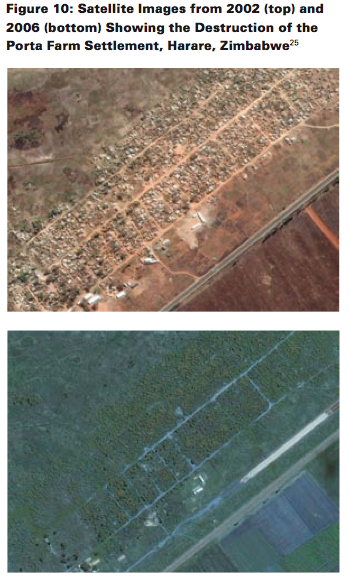One of my favourite professors, Jon Unruh, has engineered an interesting concept for learning a large amount of material quickly in his graduate level class on the geography of conflict. There are about 10-15 students in the class, and we each read one peer-reviewed article from the suggested list, and then summarize it, critically analyze it and present it to our classmates in ten minutes or less.
Last week’s conference was on applying geography to peacebuilding, and I was lucky enough to be able to review van Wyk’s 2008 overview of the use of space technology to aid human security in Africa.
******
Space for peace? The use of space technology to monitor conflict trends and human security in Africa (by van Wyk 2008) – A critical review by Sarah Topps
This article highlights the emerging trend of using space technology and satellite imagery to improve human development in African conflict zones. Jo-Ansie van Wyk describes several ways in which programs such as global positioning systems (GPS), geographic information systems (GIS), Earth observation (EO) and remote sensing can be used by governments and NGOs to track conflict, illegal activities such as logging, internal displacement, or to identify crimes against humanity.
 The article was succinctly written and used satellite images to demonstrate the potential for space science and technology (S&T) in a number of different situations – from identifying human rights abuses in Zimbabwe’s Operation Murambatsvina in 2005 to searching for underground water sources for refugees camps in Eastern Chad.
The article was succinctly written and used satellite images to demonstrate the potential for space science and technology (S&T) in a number of different situations – from identifying human rights abuses in Zimbabwe’s Operation Murambatsvina in 2005 to searching for underground water sources for refugees camps in Eastern Chad.
The article notes that satellite technologies can be costly and therefore inaccessible to some, such as African humanitarian organizations, however it does not indicate how expensive this technology is, or how cost-effective it is in saving time and money that would have been otherwise spent on locating the target aid recipients in other ways. Is it too expensive for every humanitarian organization to use it, or simply the ones which will not benefit enough from it? Could there be cooperation between the groups who own the space S&T and the humanitarian groups?
Another drawback which the author notes is the lack of a scientific support base to interpret the images in order for their governments to respond appropriately and adequately, however, depending on the scenario for which the images are being used, some may only require simple and specific training which might be taught easily enough through internet instructions from scientists elsewhere wishing to help with the conflict resolution etc.
Overall an enjoyable paper, which made no pretense about it’s purpose, which was simply to illustrate “[…]that space S&T can be applied to address conflict trends and human security in Africa” (van Wyk, 2008).
****
Interestingly, not two days later, my father sent me a link to a cautionary tale about jumping to conclusions while using space imagery. Recently, Alex Tabarrok from the economics blog: Marginal Revolution wrote an article on tried to examine the large-scale effect of Mugabe’s land redistribution policy on Zimbabwean farmland using “before and after” photographs from Google Earth.
Unfortunately, according to Google Earth expert Stefan Geens, there seems to be a slight problem with his interpretations of the “before and after” shots.
“His before-and-after images are derived from the same original raw Landsat image. They are from the same point in time.” – Stefan Geens
I would suggest reading the article itself for more details, and Tabarrok, to his credit, has since updated his post, retracting some of his previous statements, based on what Geens has pointed out.
Satellite technology has certainly proven useful in a number of situations, and may be vital to the success of many future development initiatives, however, in today’s age of freely available technology, results need to be scrutinized before acting on them as conclusive evidence, as van Wyk also noted.
– Sarah Topps
1. van Wyk, Jo-Ansie. 2008. Space for peace? The use of space technology to monitor conflict trends and human security in Africa. Conflict Trends (4):12-17
